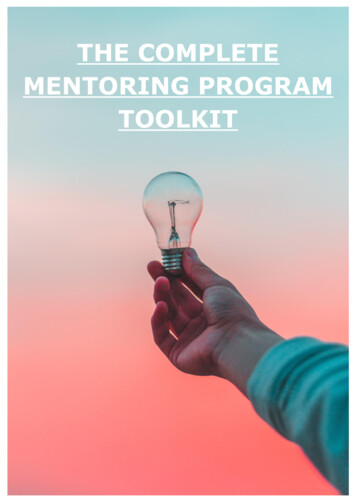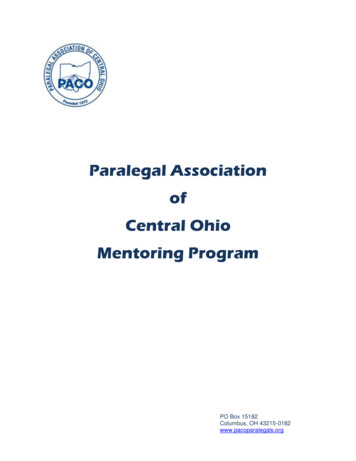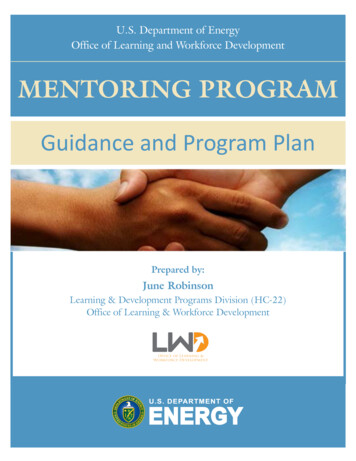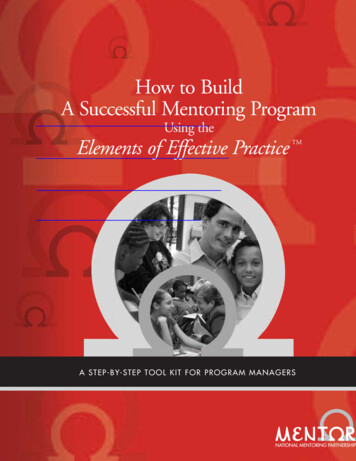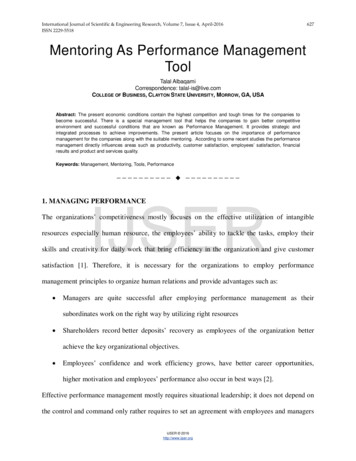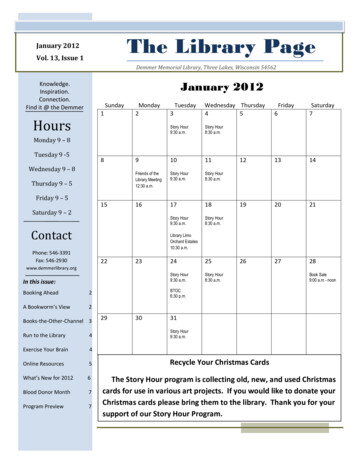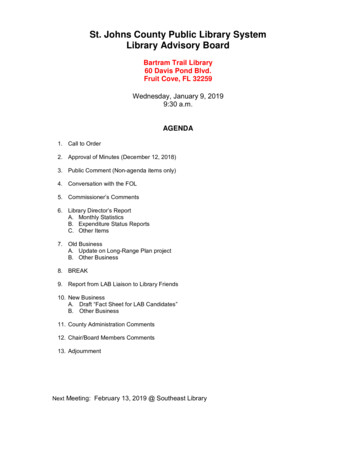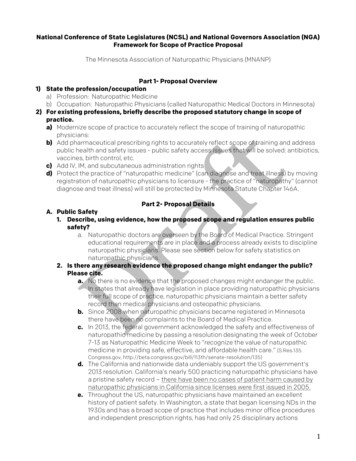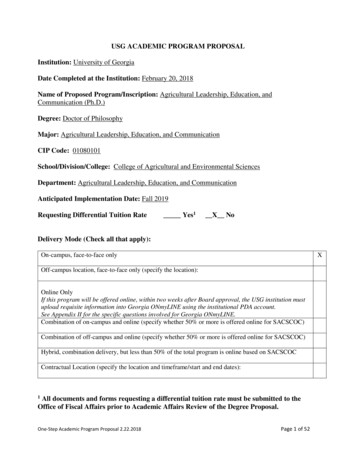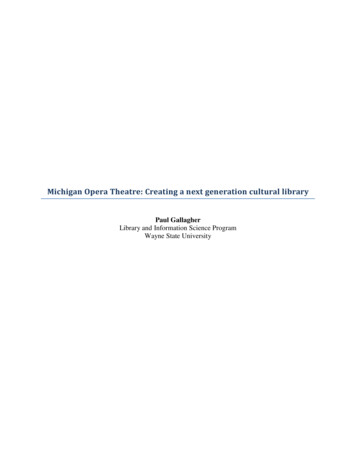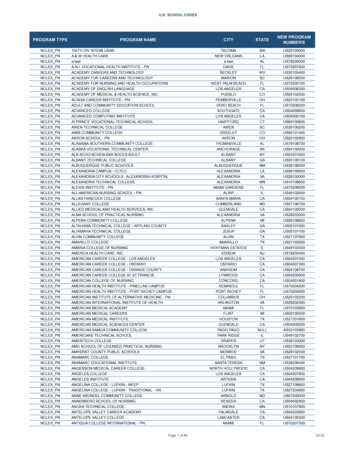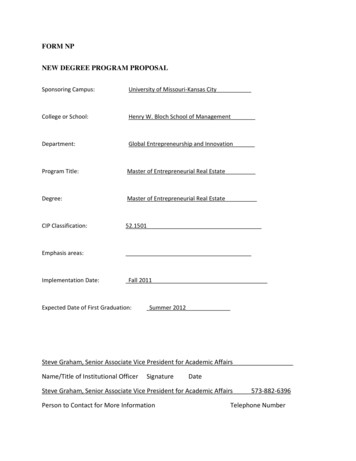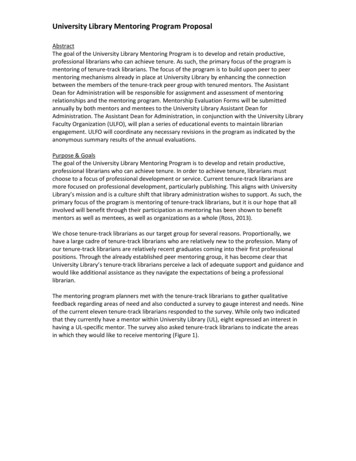
Transcription
University Library Mentoring Program ProposalAbstractThe goal of the University Library Mentoring Program is to develop and retain productive,professional librarians who can achieve tenure. As such, the primary focus of the program ismentoring of tenure-track librarians. The focus of the program is to build upon peer to peermentoring mechanisms already in place at University Library by enhancing the connectionbetween the members of the tenure-track peer group with tenured mentors. The AssistantDean for Administration will be responsible for assignment and assessment of mentoringrelationships and the mentoring program. Mentorship Evaluation Forms will be submittedannually by both mentors and mentees to the University Library Assistant Dean forAdministration. The Assistant Dean for Administration, in conjunction with the University LibraryFaculty Organization (ULFO), will plan a series of educational events to maintain librarianengagement. ULFO will coordinate any necessary revisions in the program as indicated by theanonymous summary results of the annual evaluations.Purpose & GoalsThe goal of the University Library Mentoring Program is to develop and retain productive,professional librarians who can achieve tenure. In order to achieve tenure, librarians mustchoose to a focus of professional development or service. Current tenure-track librarians aremore focused on professional development, particularly publishing. This aligns with UniversityLibrary’s mission and is a culture shift that library administration wishes to support. As such, theprimary focus of the program is mentoring of tenure-track librarians, but it is our hope that allinvolved will benefit through their participation as mentoring has been shown to benefitmentors as well as mentees, as well as organizations as a whole (Ross, 2013).We chose tenure-track librarians as our target group for several reasons. Proportionally, wehave a large cadre of tenure-track librarians who are relatively new to the profession. Many ofour tenure-track librarians are relatively recent graduates coming into their first professionalpositions. Through the already established peer mentoring group, it has become clear thatUniversity Library’s tenure-track librarians perceive a lack of adequate support and guidance andwould like additional assistance as they navigate the expectations of being a professionallibrarian.The mentoring program planners met with the tenure-track librarians to gather qualitativefeedback regarding areas of need and also conducted a survey to gauge interest and needs. Nineof the current eleven tenure-track librarians responded to the survey. While only two indicatedthat they currently have a mentor within University Library (UL), eight expressed an interest inhaving a UL-specific mentor. The survey also asked tenure-track librarians to indicate the areasin which they would like to receive mentoring (Figure 1).
University Library Mentoring Program ProposalResearchWritingPublishingServiceCollection DevelopmentInstructionReferenceFaculty engagement3rd Year ReviewPromotion & Tenure ProcessArchives0123456Figure 1. Areas in Which Tenure-Track Librarians Want Mentoring78Additionally, University Library has experienced a larger amount of turnover in recent years dueto both retirements and librarians leaving for other opportunities. In the last five years, eighttenured and nine tenure-track librarians have left the library (including four retirements).Excluding library administration, there are slightly more tenure-track and visiting librarians thantenured librarians and the majority of librarians have nine or fewer years of service to UniversityLibrary (Figure 2). The mentoring program is intended to provide a level of support and guidancethat encourages tenure-track librarians to have greater commitment to and investment inUniversity Library and helps move visiting librarians toward tenure-track positions.Tenure-Track& Visiting37Tenured24520 or more15-19310-145-91-4less than 1Figure 2. Librarians by Years of Service to the Library
University Library Mentoring Program ProposalWe have identified three objectives to further our goal. Assist with successful achievement of tenure Provide guidance and support for professional development and service activities Provide guidance in the area of faculty engagementThe goal of the program is to retain faculty with a professional mindset who can achieve tenureand be long-term productive employees as opposed to training new librarians who then moveon to other opportunities. (See Appendix A for Logic Model.)Methodology/InterventionThe focus of this proposal is to build upon peer to peer mentoring mechanisms already in placeat University Library by enhancing the connection between the members of the tenure-trackpeer group with tenured mentors.University Library currently has a peer to peer mentoring group that consists of a voluntarygroup of tenure-track librarians. Although the group is voluntary, all tenure-track librariansactively participate in the group. The group meets regularly (monthly) to share information andsupport each other in areas of need. Additional meetings of sub-groups are sometimesscheduled to address a specific need such as feedback on writing projects. This group recentlyestablished a buddy program where new hires are matched with another tenure-track librarianin order to provide additional support during the orientation process.Peer to peer mentoring is an important avenue for mentoring (Zach, 2012) and has beensuccessfully implemented in academic libraries (Level and Mach 2005). It provides participantsan avenue for “information sharing, career planning, job related feedback” (Angelique et. al2002), as well as providing an immediate cohort/network from which to build. However,multiple mentoring outlets are important, providing a mentee with a broad network structure aswell as multiple mechanisms of feedback and guidance (Niehaus and O’Meara, 2014).Additionally, the majority of tenure-track librarians at University Library have expressed aspecific interest in being paired with a tenured University Library faculty member.In order to bridge the gap between tenure-track librarians at University Library and tenuredlibrarians, we propose two plans of action 1) instituting a 1:1 or multiple:1 (mentor:mentee)program and 2) enhancing the peer to peer tenure-track group meetings by arranging fortenured librarians to serve as guest speakers on topics chosen by the peer to peer cohort.Assistant librarians (13) will be mentored by Associate or Full Librarians (10 excludingAdministration) based on individual needs. The mentor pool may be expanded to include thoseAssistant Librarians who have completed their third year reviews (2) when appropriate.The mentoring program planners have surveyed the potential pool of mentors to assess theircomfort with mentoring and areas in which they would be willing to provide mentoring. Twelvepotential mentors responded to the survey. Of those, eleven of the twelve expressed awillingness to be a mentor. Figure 3 overlays areas in which mentors are interested in providingassistance with areas in which mentees desire assistance. It may be necessary to find additionalavenues of support, especially in areas related to professional development (research, writing,and publication).
University Library Mentoring Program ProposalResearchWritingPublishingServiceCollection DevelopmentInstructionReferenceFaculty engagement3rd Year ReviewPromotion & Tenure ProcessArchives012Tenure-Track34Tenured5678Figure 3. Areas in Which Librarians are Willing to Mentor and In Which Librarians Want MentoringIn order to provide structure within the Mentoring Program, the planners in conjunction withULFO will develop documentation of the purpose, scope and process of the program;relationship guidelines; and a mentoring agreement template. These documents will serve asguidance to both mentors and mentees as they navigate the program and will be accessible viathe library website. A draft of the relationship guidelines is included in this proposal as AppendixC.University Library will launch the mentoring program with a workshop facilitated by an externalconsultant. The workshop will provide training and coaching for the participating mentors andmentees. A basic outline of the proposed workshop appears below. Explanation of program and documentsIntroduction to Mentoring session with external consultantBreakouts for mentors and menteesThe workshop will enhance the University Library mentoring program by providing mentors andmentees with an orientation to the procedures and documents specific to the program, as wellas guidance in effective mentoring strategies in order to help ensure its success. Following theworkshop, we will ask attendees to evaluate the utility of the workshop and their generalcomfort level with being a mentor or mentee.Matching of mentors and mentees will take place after the workshop and be facilitated by theAssistant Dean for Administration. Matches will be facilitated using the needs assessmentresults and a UL staff knowledge base currently under development. The knowledge base willact as a resource for areas of need outside those identified by the needs assessment results.Potential mentees will be presented with a menu of appropriate mentors to choose from andmay choose more than one mentor if that is the best way to meet their needs. Mentees will beexpected to schedule monthly meetings with their mentors to monitor the mentee’sprogress towards established goals.
University Library Mentoring Program ProposalIn addition to the one-to-one and peer group mentoring elements, University Library willsponsor a series of events throughout the year including mini-conferences focusing onprofessional development and service, two areas in which tenure-track librarians haverequested additional guidance. Planning will be the responsibility of the Assistant Dean forAdministration in conjunction with ULFO. See Appendix B for a full calendar of events andassessment plans.Tenure-track librarians will not be required to have a mentor but it is highly encouraged.Tenured librarians are not required to be mentors. Mentoring relationships will be evaluated inJuly and both parties will have the opportunity to end or continue the relationship at that point.Budget: Cost & SourcesParticipants in the mentoring program will receive a copy of The Mentor’s Guide or TheMentee’s Guide by Lois Zachary as appropriate to their role. If all librarians participate in theprogram, the total cost for the books would be 1,010. The library would like to contract with amentoring consultant to conduct the planned Mentoring Workshop. While a consultant has notyet been identified, the program planners are budgeting 4,000 for speaker fees and travelexpenses. David Lewis, Dean of University Library, has offered to fund 3,685 of the programexpenses.University Library Mentoring Program BudgetExpensesUniversity LibraryMentoring Academy grantTOTALa. Consultantb. Guidebooks for participants (31)c. HospitalityTotal 2,000 2,0001,010 1,6853,685 3,010 4,0001,0101,6856,695a. Mentoring consultant fees.b. The Mentor's Guide & The Mentee's Guide by Lois Zachary.c. Refreshments for library program launch event, box lunches for 2 mini-conferences, and refreshmentsfor closing event.Assessment PlanMentorship Evaluation Forms (see Appendix D) will be submitted by both mentors and menteesto the University Library Assistant Dean for Administration annually. The Assistant Dean forAdministration will communicate anonymous summary results of the evaluation forms to ULFO,which will determine if any changes or program maintenance is needed.University Library will also utilize this information to assess the success of the program andcompare it to the baseline information gathered during the launch of the program. UniversityLibrary’s Primary Peer Review Committee will also be surveyed to gain general impressions ofthe tenure-track cohort’s progress towards tenure.In order to measure long-term productivity, University Library will harvest data (i.e. number ofpublications and presentations, number of service commitments) from the Faculty Annual
University Library Mentoring Program ProposalReviews of mentees. The aggregate data will be an indicator of productivity. Over the course ofseveral years, we will also monitor the extent to which the library retains tenure-track facultythrough and following the successful achievement of promotion and tenure. Assessment plansare included in the program timeline presented in Appendix B.Plan for Sustainability of InitiativeThe Assistant Dean for Administration will be responsible for assignment and assessment ofmentoring relationships and the mentoring program. The Assistant Dean for Administration, inconjunction with ULFO, will plan regular educational events to maintain librarian engagement.ULFO will coordinate any necessary revisions in the program as indicated by the anonymoussummary results of the annual evaluations. Mentors will be able to count their mentoringactivities as service to the library in Faculty Annual Reports and, in further phases of theprogram, will have the opportunity to have their own mentor.Dean Lewis has pledged his support for the University Library Mentoring Program and hascommitted to the ongoing professional development of librarians as part of the library’s newstrategic plan. A letter of support from Dean Lewis is included as Appendix D.Literature citedAngelique, H., Kyle, K. and Taylor, E. (2002), Mentors and muses: new strategies for academicsuccess. Innovative Higher Education, 26(3)195-209.Level, A. V., & Mach, M. (2005). Peer mentoring: one institution's approach to mentoringacademic librarians. Library Management, 26(6/7), 301-310.Niehaus, E., O’Meara, K. (2014). Invisible but Essential: The Role of Professional Networks inPromoting Faculty Agency in Career Advancement. Innovative Higher Education 1-13.Ross, K. M. (2013). Purposeful Mentoring in Academic Libraries. Journal Of LibraryAdministration, 53(7/8), 412-428.Zachary, L. J. 2012. The mentor’s guide: facilitating effective learning relationships, 2nd Edition.San Francisco: Jossey Bass.
Your Program: University Library Mentoring Program Logic Model: Appendix ACurrent Conditions,Activities, orBarriersInputs(invested resourcesto achieve goals; keystakeholders)OutputsActivities/ Interventions(what program does)Current Conditions:Shift towardsprofessionaldevelopment fromprevious focus onserviceCurrent Activities:Tenure-track peermentoring groupUL tenure-tracklibrariansEnhances activities oftenure-track peermentoring groupOutcomes – Impact (change or benefits that result)Participation(who wereach)UL tenuretracklibrariansShort-term goals(formative tools)Mentees obtain necessaryinformation to shape andimprove:Dean / ADsFundingPotential Barrier:Fewer tenuredlibrarians thantenure-trackExample:Topic-specific workshops ledby tenured librariansUL tenuredlibrarians Mentoring Workshop1. Introduce program2. Provide mentor/menteetraining Establish formal 1:1 ormany:1 mentor/menteerelationshipsUtilize UL knowledgebaseand needs assessmentresults to facilitate matchesLevel of serviceLevel of professionaldevelopmentAbility to research,write and publishKnowledge relatedto being aprofessional librarianComfort withposition and pathtowards tenureDocumentsMentoring RelationshipGuidelinesEvaluation formsUtilization of the program:Do they participate?Do they obtain skills?Are they using it?Assumptions: Not all UL librarians will participate in the program.Timeline: See Appendix BScholarlyactivities:Long-term Outcomes(summative tools)Achievement of tenureRetentionPublicationsUL tenured librariansAdministrativesupportMediumExternal Factors or Barriers: FundingTime commitment from mentorsProductivityPresentationsSuccessful 3year reviewsLibrarians with professionalmindset who feel supportedSustainable mentoringstructure
University Library Mentoring Program Proposal: Appendix BMENTORING PROGRAM ACTIVITIESPROGRAM EVALUATIONSeptember /OctoberMentoring Program launch--training and coaching for participating"Baseline" survey--mentors & mentees. Workshopmentors and mentees, facilitated by external consultant. Booksevaluation.distributed to help guide participants through process ofestablishing relationships.NovemberAnnual P&T workshop for untenured librarians, hosted by libraryPrimary Peer Review committee and participating mentors.JanuaryMarchMentor/mentee coaching workshop, facilitated by externalconsultant. Q&A to address questions resulting from program todate & reading.Mini conference--Librarian Professional Development, includingwriting retreat for mentees, with mentors and invited guests fromthe library scholarly community."Baseline" survey--Primary Peer Review committee.Focus groups with mentors/mentees. Workshopevaluation.Survey--Primary Peer Review committee. Miniconference evaluation.JuneMini conference--Librarian Service, with library and/or non-libraryscholar(s) from wider IU community.Mini conference evaluation.JulyMentoring Program closing event--process review via groupdialogue, faciliatated by librarians & library administration.Repeat of initial "baseline" survey to gauge change.OngoingMonthly meetings between mentors & mentees.Mentorship evaluations (see Appendix D).Mentor & mentee meeting with mentee supervisor, as appropriate.Onboarding & orientation for new librarians. First week introductions to processes and culture First month, weekly check-ins 3-month check in 6-month check in
University Library Mentoring Program Proposal: Appendix CMentoring Relationship GuidelinesConfidentialityAll discussions between mentor and mentee are confidential. What is said in sessions will not beshared unless the other party gives specific permission for certain information to be shared.Ground Rules for Mutual RespectThe following ground rules applying to all mentoring relationships. Mentoring partners maychoose to establish additional ground rules. Respecting Each Other’s Timeo Meetings will begin and end on time.o If either party is unavailable or running late for a scheduled meeting, he/she willprovide notice as far in advance as possible.o An agenda will be established for meetings in order to make the best use oftime.Feedbacko Progress toward goals, accountability measures, expectations, and ground ruleswill be revisited regularly.Expectationso The mentee will be the driving force of the mentoring relationship.o The mentor and mentee will each actively participate in the mentoringrelationship.o The mentor and mentee will respect each other’s experience and expertise.o The mentor and mentee will suspend judgment.Communicationo Each party will actively listen to the other.o Communication should be open, candid, and direct while remaining respectful.o Mentoring meetings are not intended as a forum for complaining or therapysession, but rather should focus on the future development of the mentee.Ending the Mentoring RelationshipBoth mentor and mentee will have a formal opportunity to end the mentoring relationship atthe end of six months if either feels the relationship is unproductive. Either the mentor ormentee may consult with the Assistant Dean for Administration if she/he feels the mentoringrelationship should end prior to the six month review. If goals are achieved and either partyfeels the relationship has run its course, either party may end the mentoring relationship at anytime.
University Library Mentoring Program Proposal: Appendix DMentorship Evaluation: Mentor evaluating MenteeYour name: Mentor’s name:Description of Relationship1. How often did you and your mentee communicate? (e.g., e-mail, in person, telephone)2. How long have you had this relationship?3. How would you characterize the strengths and weaknesses of your relationship?4. How could this mentoring relationshi
program, the total cost for the books would be 1,010. The library would like to contract with a mentoring consultant to conduct the planned Mentoring Workshop. While a consultant has not yet been identified, the program planners a
